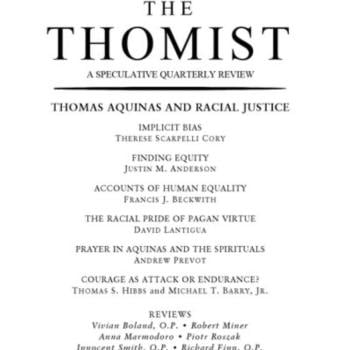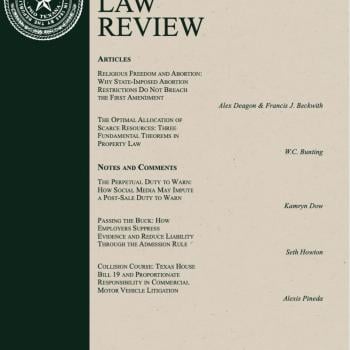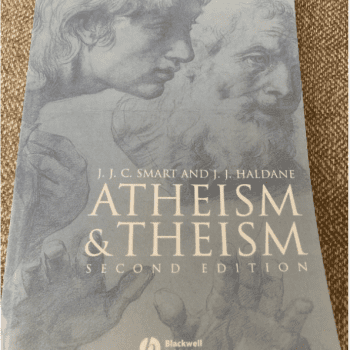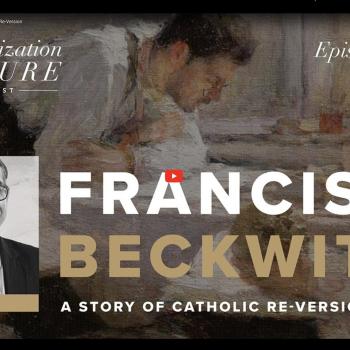 Today in my undergraduate class–Contemporary Moral Problems: Law, Morality, and Justice–we began discussing an article authored by Michael Ruse and E. O. Wilson, “The Evolution of Ethics,” published in The New Scientist in 1985. Later this week we will read an opposing view authored by C. S. Lewis, from the first five chapters of his book Mere Christianity. I first began using both pieces in class in Fall 2016 while I was a visiting professor at the University of Colorado, Boulder. It was for the course, Philosophy and Religion. This morning I remembered that I had actually published a brief essay in The Catholic Thing on why I think Lewis is right and Ruse and Wilson are wrong. What follows is my analysis and argument from that piece:
Today in my undergraduate class–Contemporary Moral Problems: Law, Morality, and Justice–we began discussing an article authored by Michael Ruse and E. O. Wilson, “The Evolution of Ethics,” published in The New Scientist in 1985. Later this week we will read an opposing view authored by C. S. Lewis, from the first five chapters of his book Mere Christianity. I first began using both pieces in class in Fall 2016 while I was a visiting professor at the University of Colorado, Boulder. It was for the course, Philosophy and Religion. This morning I remembered that I had actually published a brief essay in The Catholic Thing on why I think Lewis is right and Ruse and Wilson are wrong. What follows is my analysis and argument from that piece:
Ruse and Wilson maintain that our sense of morality, or what Lewis calls “the Law of Human Nature,” can be fully accounted for by biological evolution, and thus, it is superfluous to claim that our moral sense comes from God. They argue that nature has equipped us with certain dispositions (or “epigenetic rules”) that predispose us to favor some actions over others so that we can more efficiently pass on our genes.
So, for example, we are predisposed to fear lions, dislike incest, and be altruistic. To put it another way, being a creature’s meal, contributing to a shallow gene pool, or not helping those closest to you diminishes the utility of your genes’ quest for everlasting life.
For Ruse and Wilson, there is a kind of paradox here: in order for our “selfish gene” to get where it needs to go, it must reside in an organism that has developed dispositions that incline it to do and not do certain things, e.g., acting altruistically or not succumbing to the allure of exciting safari trips, which oftentimes seem completely unselfish. That is, our social mores are derived from a shared moral sense, nimble in its ability to negotiate between communitarian and individual interests, that nevertheless arises from ruthlessly efficient and purely material biological mechanisms that are at root “selfish.”
But why does it seem, as Lewis argues, that there really is a moral law that we are obligated to obey and did not invent? And since the idea of a moral law implies a moral law-giver, wouldn’t it seem to follow that even if the evolutionary account told us the whole biological story, it could not tell us the whole story simpliciter?
After all, even if you could give a full and complete evolutionary account of the human brain, why would you automatically think that the evolutionary account can explain everything the intellect may think it knows that does not seem reducible to mere matter in motion, e.g., that it is not a brain, or that beauty, abstract objects, and a first cause of being all exist?
Do you seriously believe that if I can explain the toaster I have explained the toast? (Of course, some people, like Ruse and Wilson, deny the existence of immaterial things. But my point is that there is nothing about evolutionary theory per se that entails that denial).
Ruse and Wilson have an answer: “Morality, or more strictly, our belief in morality, is merely an adaptation put in place to further our reproductive ends. Hence the basis of ethics does not lie in God’s will. . . .In an important sense, ethics as we understand it is an illusion fobbed off on us by our genes to get us to cooperate. It is without external grounding. Ethics is produced by evolution, but not justified by it, because, like Macbeth’s dagger, it is serves a powerful purpose without existing in substance.”
Thus, for Ruse and Wilson, the common belief that there is a moral law is the result of a trick played on us by our genes, since believing that there is a moral law, even though there really is not one, best contributes to the reproductive success of the human race.
What should we make of this? We should, of course, commend Ruse and Wilson for the neatness and simplicity of their argument. There is a kind of elegance to their case. If one begins, as they do, with the belief that philosophical materialism is the correct view of things, their position is compelling.
This is also true, however, of other philosophical projects that rely on One Big Idea. Marx can explain everything through the prism of class struggle. For Heraclitus, there are no stable substances, and for Parmenides, nothing ever changes. In our own day, certain social movements see all dissent from their views as Hate. But in each case, the same One Big Idea that so powerfully explains so much does so at the price of explaining away what undermines the plausibility of the One Big Idea.
What’s the price for the Ruse/Wilson theory? I must confess that it’s above my pay grade: undermining everything in which we believe. Think about it: if your belief in the moral law can be attributed entirely to our genes tricking us into believing that there really is a moral law, why not extend that same analysis to all other beliefs that arise from your mind? After all, the same mind that entertains belief in the moral law also entertains beliefs about art, literature, science, philosophy, mathematics and the existence of other people.
Perhaps these beliefs also refer to nothing real as well. If “ethics as we understand it is an illusion fobbed off on us by our genes to get us to cooperate,” maybe art, literature, science, philosophy, mathematics, and the existence of other people as we understand them are illusions fobbed on us by our genes to get us to cooperate.
I can only speak for myself, but abandoning the belief that there is a real moral law is not worth the cost of losing my mind.












